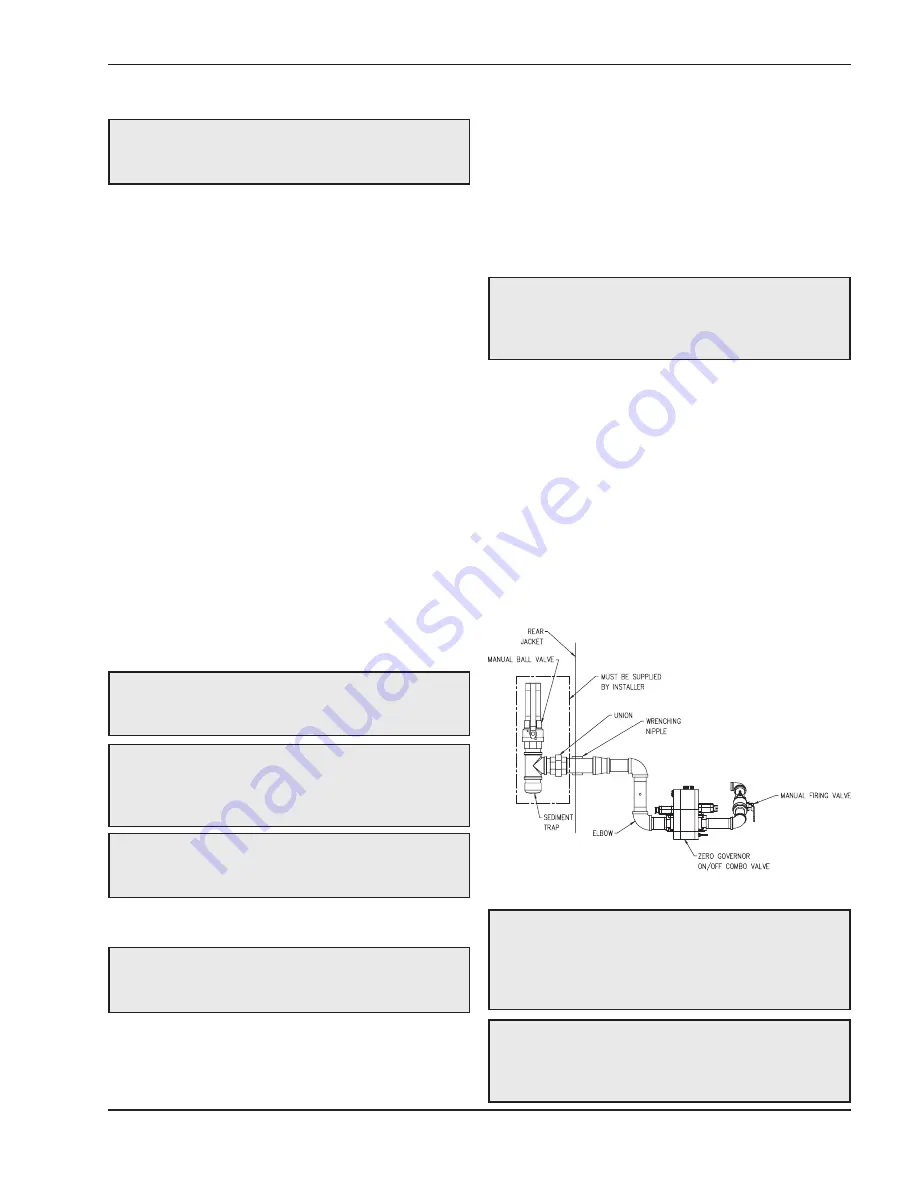
21
CAUTION:
Combustion air must not be contaminated
by corrosive chemical fumes which can damage the
heater and void the warranty.
Potable Water and Space Heating
1. All piping materials and components connected to
the water heater for the space heating application
shall be suitable for use with potable water.
2. Toxic chemicals, such as used for boiler treat-
ment, shall not be introduced into the potable
water used for space heating.
3. If the heater will be used to supply potable water,
it shall not be connected to any heating system or
components previously used with a non-potable
water heating appliance.
4. When the system requires water for space heat-
ing at temperatures higher than 140°F (60°C), a
means such as a mixing valve shall be installed to
temper the water in order to reduce scald hazard
potential.
Automatic Chemical Feeders
All chemicals must be introduced and completely dilut-
ed into the water before being circulated through the
heater. High chemical concentrations will result when
the pump is not running (e.g. overnight).
CAUTION:
When this heater is used for both potable
water and space heating, observe the following to
ensure proper operation.
NOTE:
Failure of a heat exchanger due to lime scale
build-up on the heating surface, low pH or other
chemical imbalance is non-warrantable.
NOTE:
High chemical concentrates from feeders
that are out of adjustment will cause rapid corrosion
to the heat exchanger. Such damage is not covered
under the warranty.
Gas Supply
Gas piping
must
have a sediment trap ahead of the
heater gas controls,
and
a manual shut-off valve
lo-cated outside the heater jacket. It is recommend-
ed that a union be installed in the gas supply piping
DANGER:
Make sure the gas on which the heater
will operate is the same type as specified on the
heater’s rating plate.
adjacent to the heater for servicing. The gas supply
pressure to the heater must not exceed 10.5 in. WC for
natural gas or 13.0 in. WC for propane gas. A pounds-
to-inches regulator must be installed to reduce the gas
supply pressure if it is higher than noted above. This
regulator should be placed a minimum distance of 10
times the pipe diameter upstream of the heater gas
controls. Refer to Table I for maximum pipe lengths.
Gas Supply Connection
The heater must be isolated from the gas supply piping
system by closing the upstream manual shut-off valve
during any pressure testing of the gas supply piping
system at test pressures equal to or less than 1/2 psi
(3.45 kPa). Relieve test pressure in the gas supply
line prior to re-connecting the heater and its manual
shut-off valve to the gas supply line.
FAILURE TO
FOLLOW THIS PROCEDURE MAY DAMAGE THE
GAS VALVE
. Over-pressurized gas valves are not
covered by warranty. The heater and its gas connec-
tions shall be leak-tested before placing the appliance
in operation. Use soapy water for leak test. DO NOT
use an open flame.
CAUTION:
The heater must be disconnected from
the gas supply during any pressure testing of the
gas supply system at test pressures in excess of 1/2
psi (3.45 kPa).
Fig. 23: Gas Supply Connection
CAUTION:
Do not use Teflon tape on gas line
pipe thread. A pipe compound rated for use with
natural and propane gases is recommended. Apply
sparingly only on male pipe ends, leaving the two
end threads bare.
CAUTION:
Support gas supply piping with hangers,
not by the heater or its accessories. Make sure the
gas piping is protected from physical damage and
freezing, where required.
















































